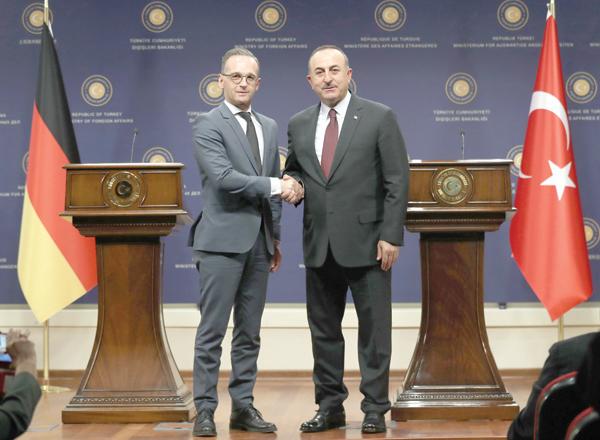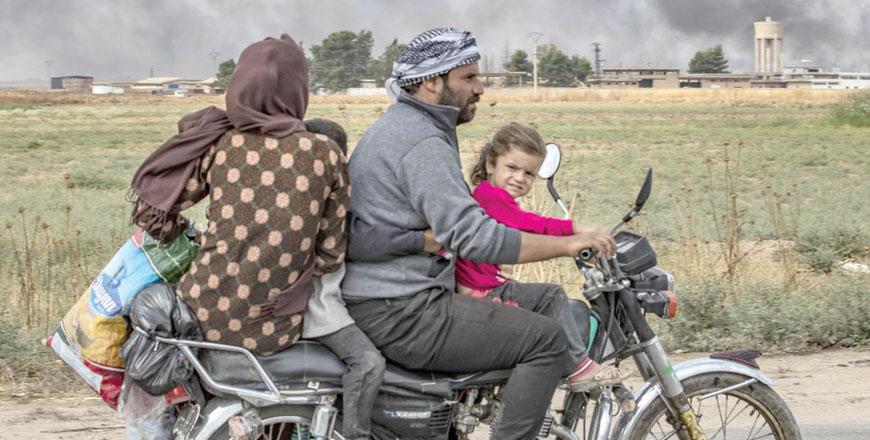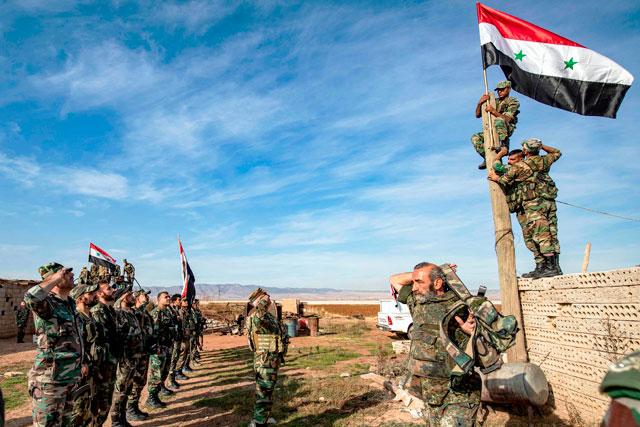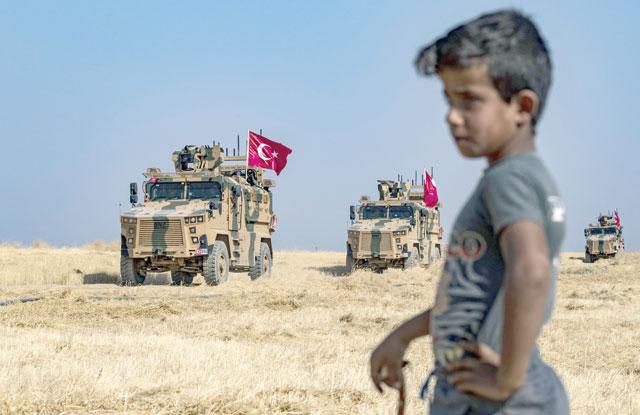You are here
Erdogan says he will clear 'terrorists' from Syria border if Sochi deal fails
By AFP - Oct 26,2019 - Last updated at Oct 26,2019

Turkish Foreign Affairs Minister Mevlut Cavusoglu (right) and his German counterpart Heiko Maas pose before a joint press conference after their meeting at the Turkish foreign ministry in Ankara, Turkey, on Saturday (AFP photo)
ANKARA — President Recep Tayyip Erdogan said on Saturday that Turkey would "clear terrorists" on its border in northern Syria if Syrian Kurdish militia did not withdraw by the end of a deadline agreed with Russia.
"If the terrorists are not cleared at the end of the 150 hours, we will take control and clean it ourselves," Erdogan said during a speech in Istanbul, referring to the YPG militia which Turkey views as a "terrorist" offshoot of Kurdish PKK insurgents.
Erdogan and Russian President Vladimir Putin agreed a deal in the Black Sea resort of Sochi on Tuesday in which Moscow will "facilitate the removal" of the fighters and their weapons from within 30 kilometres of the border.
The deadline ends at 6:00 pm local time (15:00 GMT) on October 29.
Despite his threat, Erdogan said Turkey had "to a large extent" reached its goal in terms of setting up a "safe zone" to protect against attacks from the so-called Daesh extremist group and the Kurdish YPG militia.
Turkey has repeatedly criticised US support to the YPG, who spearheaded the fight against Daesh under the Syrian Democratic Forces (SDF) banner.
For Ankara, the YPG is as dangerous as the Kurdistan Workers' Party (PKK), blacklisted as a terror group by Turkey and its Western allies.
Erdogan also urged the international community to support establishing a "safe zone" for some of the 3.6 million Syrian refugees in Turkey.
"If there is no support for the projects we are developing for between one and 2 million in the first stage for their return, we will have no option but to open our doors, and let them go to Europe," he warned.
After similar threats were accused of being blackmail, Erdogan insisted he was "not blackmailing anyone" but "putting forward a solution".
Earlier this month, Turkey and the US reached an agreement on the YPG's withdrawal from a 120-kilometre zone between Tal Abyad and Ras Al Ain following Ankara's operation supporting Syrian proxies against the Kurdish fighters, which began on October 9.
The US said this had been completed within five days and in return, Ankara agreed to halt its offensive.
But Erdogan on Saturday said the US was unable to "clean the area" of the YPG.
"They sent us a written statement saying they had cleared the area after 120 hours, but unfortunately, they could not clean the area," Erdogan said.
The Turkish defence ministry earlier Saturday said there had been "harassment and attacks with mortars and sniper shootings" by the YPG in the 120-kilometre area during reconnaissance-surveillance and clearing activities.
'Unrealistic' German plan
Turkish Foreign Minister Mevlut Cavusoglu earlier Saturday said a German suggestion for an international force to establish a "safe zone" in northern Syria was not realistic.
Speaking at a press conference in Ankara alongside his German counterpart Heiko Maas, Cavusoglu said: "At this point, we don't find it really realistic."
Earlier this week, German Defence Minister Annegret Kramp-Karrenbauer suggested a "security zone" could allow international forces, including European troops, to resume the fight against Daesh as well as to "stabilise the region".
Maas also appeared to pour cold water on Kramp-Karrenbauer's idea, saying that he and Cavusoglu "had no time for issues of a theoretical nature because the people in Syria don't have time for theoretical debates".
"We are told by everyone that this is not a realistic proposal," Maas added.
Maas represents Merkel's junior, centre-left coalition partners the SPD, while Kramp-Karrenbauer is leader of the chancellor's conservative CDU party.
The German government has been sharply divided over Kramp-Karrenbauer's plan.
The commander of Kurdish forces in Syria has welcomed the plan, as has the US, but so far it has gained little further traction and few details are available.
Related Articles
ANKARA — Turkey outlined on Monday its plans for a 120-kilometre "safe zone" in Syria on the eve of a key withdrawal deadline, as President
ISTANBUL — Turkish and Russian forces carried out another joint patrol in northern Syria on Tuesday, while President Recep T
ANKARA — President Recep Tayyip Erdogan on Saturday renewed Turkey's threat to launch an "air and ground" operation in Syria against a Kurdi



















